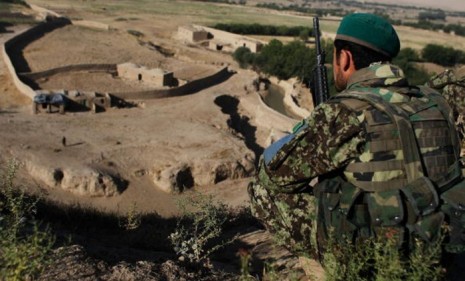Is a Taliban peace deal possible?
Afghan President Hamid Karzai's government is exploring reconciliation with the Taliban, but both the U.S. and the Afghan people are skeptical

A free daily email with the biggest news stories of the day – and the best features from TheWeek.com
You are now subscribed
Your newsletter sign-up was successful
With the U.S. planning to start withdrawing troops from Afghanistan next year, the Afghan government of President Hamid Karzai is pushing to strike a deal with Taliban insurgent leaders. Pakistan's military and intelligence service, which has old ties to the Islamist group that once ran Afghanistan, supports the reconciliation bid, but many in Afghanistan say any power-sharing arrangement with the Taliban is a formula for disaster, and CIA Director Leon Panetta said he has seen "no evidence" Taliban fighters will lay down their arms. Is there really any chance of reconciliation in Afghanistan? (Watch an al Jazeera report on Karzai's meetings)
The U.S. should get behind this effort: The Obama administration's "continued reluctance" to "embrace the possibility of political reconciliation with the Taliban just makes no sense," says Michael Cohen at Democracy Arsenal. If, as the White House says, al Qaeda has been weakened, now would be the perfect time to "publicly float the idea that we can accept a political role for the Taliban as long as they don't allow any al Qaeda safe haven."
"What's our End Game for Afghanistan?"
The Week
Escape your echo chamber. Get the facts behind the news, plus analysis from multiple perspectives.

Sign up for The Week's Free Newsletters
From our morning news briefing to a weekly Good News Newsletter, get the best of The Week delivered directly to your inbox.
From our morning news briefing to a weekly Good News Newsletter, get the best of The Week delivered directly to your inbox.
There's no such thing as a "good" Taliban: Obama has good reason to be skeptical of "Pakistan's good Taliban theory," say the editors of the Times of India. The Taliban have a vision of Afghanistan's future that is incompatible with what the U.S. and the Afghan people want. Even if some Taliban militants aren't as hard-core as others, any kind of deal that depends on the willingness of Islamist radicals to work within somebody else's rules is "dangerous."
"U.S. finally realizes there’s nothing called good Taliban, gets cautious"
In the short term, "reconciliation" means more intense fighting: "Each side wants to bargain from a position of maximum strength," says David Ignatius in The Washington Post, "and for the foreseeable future that means trying to inflict maximum pain." In the Pashtun culture, reconciliation is only possible when there is "a gundi, or balance of power, that conveys mutual respect and security." So far, that's not in sight.
"What would reconciliation look like for the U.S. and Taliban?"
A free daily email with the biggest news stories of the day – and the best features from TheWeek.com